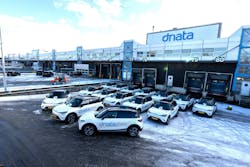dnata Enhances Sustainability Efforts with All-Electric Airside Car Switch in Amsterdam
dnata, a leading global air and travel services provider, has made a further step to reduce its carbon footprint by 50 percent by 2030, as part of its eight-year green operations strategy.
The company has taken delivery of 15 electric smart cars, and will soon receive five more, replacing all airside diesel vehicles in its fleet at Amsterdam Schiphol Airport (AMS) in The Netherlands. This transition follows the installation of airside-based electric vehicle charging infrastructure at AMS, allowing dnata an immediate shift to sustainable transport.
As a result of its latest investment, more than 65% of dnata’s 250 pieces of ground support equipment (GSE) is now electric or powered by solar energy in The Netherlands. The remaining legacy GSE is fuelled by 100% hydro-treated vegetable oil (HVO) biofuel, resulting in a 90% reduction in total carbon dioxide emissions throughout its lifecycle.
Jan van Anrooy, managing director, dnata Netherlands, said: “We are committed to investing in green equipment and infrastructure to maximise environmental efficiency across our operations. Through close collaboration with our partners, we have promptly leveraged the airport’s new infrastructure by replacing our entire car fleet. As a result, over two-thirds of our fleet now operates on electric power or solar energy.
“We will continue our efforts to further reduce our environmental footprint, contributing to dnata’s commitment to reduce global carbon emissions.”
dnata currently provides ground and cargo handling services to 37 airlines in Amsterdam with a team of 1,000 dedicated aviation professionals, who handle 10,000 flights and move 550,000 tonnes of cargo annually.
dnata is a leading global air and travel services provider. Established in 1959, the company offers quality and safe ground handling, cargo, travel, catering and retail services in over 30 countries across six continents. In the financial year 2022-23, dnata’s customer-oriented teams handled over 710,000 aircraft turns, moved over 2.7 million tonnes of cargo, uplifted 111.4 million meals, and recorded a total transaction value (TTV) of travel services of US$ 1.9 billion.
